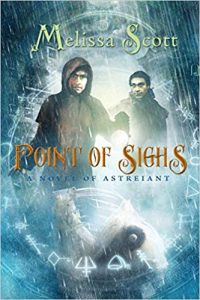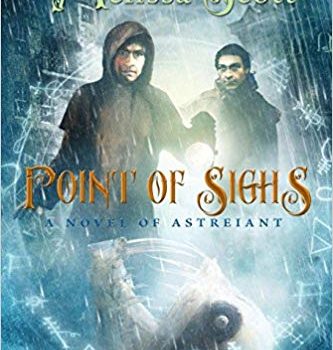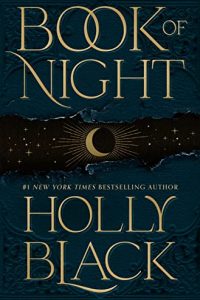Liz Bourke Reviews Point of Sighs by Melissa Scott
 Point of Sighs, Melissa Scott (Lethe Press 978-1-59021-645-3, $18.00, 276pp, tp) May 2018. Cover by Ben Baldwin.
Point of Sighs, Melissa Scott (Lethe Press 978-1-59021-645-3, $18.00, 276pp, tp) May 2018. Cover by Ben Baldwin.
Melissa Scott’s Astreiant is a city to conjure with. It shares some commonalities with Ellen Kushner’s Riverside, though the first book, Point of Hopes (co-written with the late Lisa A. Barnett) was initially published in 1995 to Kushner’s Swordspoint‘s 1987. (And it involves a little less duelling.) Astreiant is a rich, complex setting, a mercantile city where women dominate high-status roles, and where astrology has a real and significant effect on people’s lives: if your stars are bad for warfare, you won’t last very long in a military career, for example. This is a world where magic is real, and where it sometimes causes problems – but where most of the citizens’ problems are the ordinary troubles of urban living: crime, trade, and family.
Point of Hopes was followed by the (also co-authored) Point of Dreams, and then by solo works Point of Knives and Fairs’ Point. Now Scott returns to Astreiant with Point of Sighs, another gorgeously rich and atmospheric novel, and a fantastically good story. It might be obvious, but I’m kind of a fan.
All the Astreiant novels to date have revolved around the investigation of a crime, and Point of Sighs is no different. Nicolas Rathe is a senior pointsman, and the pointsmen and -women investigate crimes and keep order in the various districts of the city. Unlike his colleagues, Nico doesn’t participate in the custom of taking fees, a custom that’s an incentive for the points to do a good job while also creating a social norm that a bought point stays bought. His lover, Philip Eslingen – now known as Philip vaan Esling – is a captain in the newly formed City Guard, an organisation that has the potential to encroach on the points’ traditional spheres of authority, even though the Guard is supposed to only police the nobility and the area outside the city walls. It’s new and controversial, and about to put Philip in the middle of a dispute between two points’ stations.
Astreiant has experienced a really wet autumn, and storms at sea have delayed merchant ships from abroad. This is especially bad news for the tea merchants and tea blenders. The murder of a captain whose cargo was tea brings professional rivalry between the points at Point of Sighs – where the murder took place – and Point of Dreams to a head. Nico’s a senior pointsman at Dreams, and he doubts the evidence against the son of a prominent Dreams merchant house. That merchant house – in the tea business – has asked Philip, as a representative of the City Guard, to look out for their interests in the midst of this professional rivalry.
The mystery only deepens with the murder of one of Point of Sighs’ senior points. The dockers in Point of Sighs are extorting higher fees from the merchants, and there are indications that the murdered pointsman was more than usually corrupt. But it seems there’s even more trouble to contend with: the return of the legendary Riverdeme, the hungry spirit of the city’s river, who was once propitiated by the sacrifice of beautiful young men. The Riverdeme has long been bound by the city’s bridges, but with vicious dogfish – associated with her for centuries – in the water and river-drowned (and fish-eaten) corpses turning up at a much higher rate than usual, it looks like Nico and Philip have a little more than a simple murder to solve. This isn’t good news for Philip. His stars are bad for water, and he’s a very handsome man – exactly the kind of man that the Riverdeme used to take as tribute.
This is a delightful book. Scott depicts the relationship between Nico and Philip with sensitivity and grace: not only their strong connection and attraction and mutual loyalty, but also the insecurity that haunts the newness of their partnership, and the complex strains of negotiating the professional relationship that exists alongside the personal one. Astreiant as a setting feels rich and lived-in: Scott’s prose brings its streets and inhabitants to full-fleshed life, and at times it feels as though you can smell the mud and feel the damp fog on the river, the heavy rain that’s a presence throughout the book. The secondary characters feel like real and complicated individuals, with lives extending off the page: the Staenka tea family, whose youngest male member is accused of murder; the points in Dreams and Sighs; the young candidate for the City Guards, Balfort de Vian, whom Philip doesn’t realise has conceived an unrequited passion for him – they’re all complex and engaging people.
Excellently paced, strongly characterised, with a twisty murder plot and a great sense of place, Point of Sighs is a very engaging book. I enjoyed it enormously, and I’ll be waiting impatiently for Scott’s next outing to Astreiant.
Liz Bourke is a cranky queer person who reads books. She holds a Ph.D in Classics from Trinity College, Dublin. Her first book, Sleeping With Monsters, a collection of reviews and criticism, is out now from Aqueduct Press. Find her at her blog, her Patreon, or Twitter. She supports the work of the Irish Refugee Council and the Abortion Rights Campaign.
This review and more like it in the July 2018 issue of Locus.
 While you are here, please take a moment to support Locus with a one-time or recurring donation. We rely on reader donations to keep the magazine and site going, and would like to keep the site paywall free, but WE NEED YOUR FINANCIAL SUPPORT to continue quality coverage of the science fiction and fantasy field.
While you are here, please take a moment to support Locus with a one-time or recurring donation. We rely on reader donations to keep the magazine and site going, and would like to keep the site paywall free, but WE NEED YOUR FINANCIAL SUPPORT to continue quality coverage of the science fiction and fantasy field.








